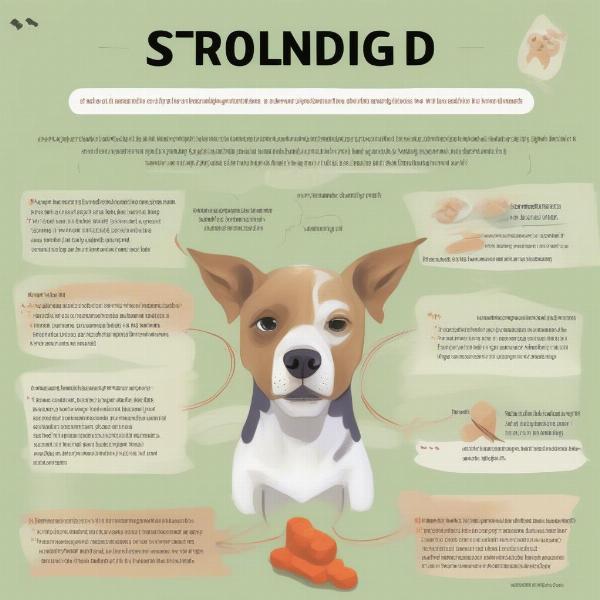Strongid for dogs is a common dewormer used to treat and prevent roundworms and hookworms. These intestinal parasites can cause a range of health problems, from mild discomfort to severe illness. Understanding how Strongid works, when to use it, and potential side effects is crucial for responsible dog ownership. This guide will provide you with everything you need to know about using Strongid effectively for your canine companion.
What is Strongid for Dogs and How Does It Work?
Strongid, also known by its generic name pyrantel pamoate, is an anthelmintic medication. This means it works by paralyzing the worms, preventing them from absorbing nutrients and eventually leading to their expulsion from the dog’s digestive system. It’s important to note that Strongid primarily targets roundworms and hookworms, and may not be effective against other types of intestinal parasites like tapeworms or whipworms. If you’re unsure about the type of worm your dog has, consult your veterinarian for proper diagnosis and treatment.
When Should You Use Strongid for Dogs?
Strongid can be used both for treatment and prevention of roundworm and hookworm infections. Your veterinarian may recommend Strongid if your dog shows symptoms like vomiting, diarrhea, weight loss, or a pot-bellied appearance. These symptoms can indicate a parasitic infection, but it’s essential to have your dog examined to confirm the diagnosis. For puppies, deworming with Strongid is often recommended as part of their initial healthcare regimen due to the common occurrence of roundworm transmission from the mother.
What is the Correct Dosage of Strongid for Dogs?
The dosage of Strongid depends on your dog’s weight and the severity of the infection. It’s crucial to follow your veterinarian’s instructions carefully and never exceed the recommended dose. Overdosing can lead to adverse side effects. Typically, Strongid is administered as a single dose, but your vet may recommend repeated doses depending on the specific situation. Always consult with your vet for the appropriate dosage for your dog.
Are There Any Side Effects of Strongid in Dogs?
Strongid is generally considered safe for dogs. However, some dogs may experience mild side effects such as vomiting, loss of appetite, or diarrhea. These side effects are usually temporary and resolve on their own. In rare cases, more serious side effects like tremors, drooling, or incoordination can occur. If you notice any unusual symptoms after administering Strongid, contact your veterinarian immediately.
 Strongid Side Effects and Precautions for Dogs
Strongid Side Effects and Precautions for Dogs
Preventing Worm Infections in Dogs
Preventing worm infections is always better than treating them. Regularly deworming your dog, especially if they are puppies or spend a lot of time outdoors, is essential. Practicing good hygiene, such as picking up after your dog and regularly cleaning their living area, can also help minimize the risk of infection.
What if I Miss a Dose of Strongid?
If you miss a dose, administer it as soon as you remember. However, if it’s almost time for the next dose, skip the missed dose and continue with the regular schedule. Never give a double dose to compensate for a missed one.
Conclusion
Strongid is a valuable tool in protecting your dog from roundworms and hookworms. By understanding how Strongid works, when to use it, and potential side effects, you can ensure your dog’s health and well-being. Always consult your veterinarian for diagnosis and treatment recommendations tailored to your dog’s specific needs.
FAQ
- Is Strongid safe for pregnant dogs? While generally safe, it’s best to consult your vet before giving Strongid to a pregnant dog.
- Can I buy Strongid over the counter? In some places, yes. However, it’s always best to consult with your vet before administering any medication.
- How often should I deworm my dog with Strongid? This depends on your dog’s lifestyle and risk factors. Consult your vet for a personalized deworming schedule.
- What should I do if my dog vomits after taking Strongid? Contact your veterinarian for advice.
- Can Strongid be given with other medications? Inform your vet about all other medications your dog is taking before administering Strongid.
- How do I know if my dog has worms? Your vet can perform a fecal exam to diagnose intestinal parasites.
- Can humans get worms from dogs? Yes, some dog worms can be transmitted to humans. Practice good hygiene to minimize the risk.
ILM Dog is your one-stop resource for expert advice on dog breeds, health & medical care, training & behavior, nutrition & feeding, grooming & hygiene, and products & accessories. We offer practical, reliable information for dog owners of all experience levels. Contact us today to learn more about how we can help you and your furry friend live a happy and healthy life together. Email: [email protected]. Phone: +44 20-3965-8624. Visit ILM Dog for more valuable resources.